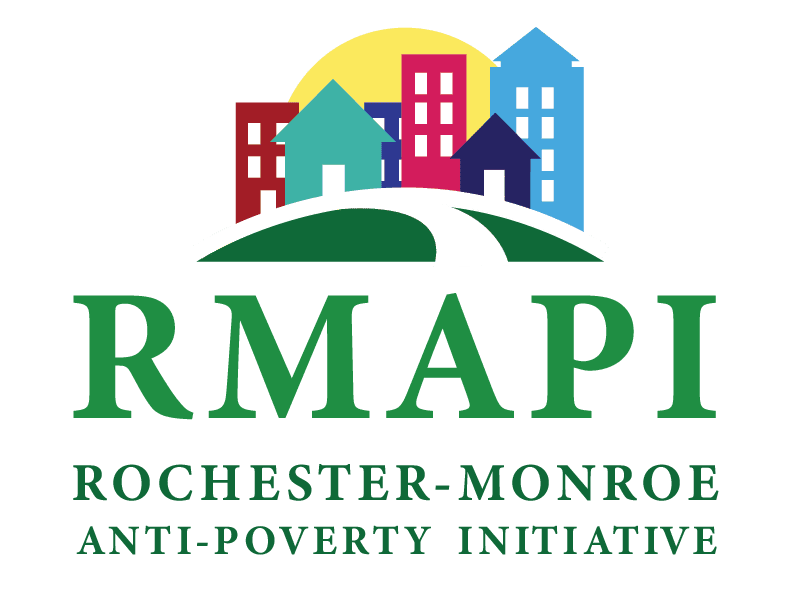What if everyone had what they needed to thrive?
In Rochester and Monroe County, many of our neighbors are living in poverty.
⌵ Unity Agenda Table of Contents
What does poverty look like?
If you’re among the many in our communities who are struggling, then you might know what poverty feels like to you.
Maybe it feels like isolation. Desperation. The inability to make ends meet. Eviction. Struggles to feed your family. Or maybe it feels like your day-to-day reality. These experiences are valid, and you are not alone in going through them. [If this is you, you’re a context expert.]
Poverty is different for every person, household, neighborhood, and city that experiences it. And there are almost as many “anti-poverty” initiatives that aim to support people with the basic needs and services they are often going without — like food, shelter, education, Internet access, and other community resources. These initiatives, organizations, and people are vital to our community.
How is poverty defined?
But here’s the thing. Poverty is a problem that results from historic and continuing systems of oppression and discriminatory policies.
Policies and practices—across the U.S., and right here in Rochester. These systems, policies, and practices have created enduring inequities and conditions for Black people, Indigenous people, and People of Color, both overtly and covertly, preventing access to upward mobility.
“Historic and continuing discriminatory policies, practices and systems in the US and the Rochester area create enduring inequities and conditions for Black people, Indigenous people, and People of Color, actively and passively preventing access to upward mobility.”
– Unity Agenda Problem Statement
14% of us within the nine-county region are experiencing the challenges, barriers, and negative effects of poverty. But this poverty is not evenly distributed.
live in poverty, compared to 10% of white people.
The Fish, the Lake, and the Groundwater.
Structural racism and poverty are complex concepts. In an effort to try to make them easily understandable, we adapted this version of “the Groundwater” as a metaphor for systemic poverty. The model is adapted from Bayard Love and Deena Hayes-Greene of the Racial Equity Institute.
Imagine you have a lake in front of your house and you come outside one morning to find one fish is floating belly-up dead. If that happens, it makes sense to analyze the fish. What is wrong with it? Imagine the fish is one person living in poverty. We’d ask: Did it work hard enough? Is it incapable of finding a job?
But if you come out to that same lake and half the fish are floating belly-up dead, what should you do? This time you’ve got to analyze the lake. Imagine the lake is our economic system and half the people are struggling. This time we’d ask: Might the system itself be causing such consistent, unacceptable outcomes for people living in poverty? If so, how?
Now… picture five lakes around your house, and in each and every lake half the fish are floating belly-up dead! What is it time to do? We say it’s time to analyze the groundwater. How did the water in all these lakes end up with the same contamination? On the surface the lakes don’t appear to be connected, but it’s possible—even likely—that they are. In fact, over 95% of the freshwater on the planet is not above ground where we can see it; it is below the surface in the groundwater.
This time we can imagine half the people in a given region are living in poverty, half the people suffer from ill health, half are performing poorly in the criminal justice system, half are struggling in and out of the welfare system, and it’s often the same people in each system!
By using a “groundwater” approach, one might begin to ask these questions: Why are educators creating the same racial inequity as doctors, police officers, and social workers? How might our systems be connected? Most importantly, how do we use our positions in one system to impact a structural racial arrangement that might be deeper than any single system? To “fix fish” or clean up one lake at a time simply won’t work—all we’d do is put “fixed” fish back into toxic water or filter a lake that is quickly recontaminated by the toxic groundwater.
Our groundwater metaphor is designed to help people internalize the reality that we live in a racially structured society, and that that is what causes racial inequity. The metaphor is based on three observations: racial inequity looks the same across systems, socioeconomic difference does not explain the racial inequity; and inequities are caused by systems, regardless of people’s culture or behavior. Embracing these truths forces leaders to confront the reality that all our systems, institutions, and outcomes emanate from the racial hierarchy on which the United States was built. In other words, we have a “groundwater” problem, and we need “groundwater” solutions.
So what can be done?
When we think about the problem of poverty from all angles and levels, and when many people, in all sectors, from all backgrounds and walks of life, come together with a unified goal—a lot can change. Together, we can use our collective power to eradicate poverty.
– Unity Agenda Impact Statement
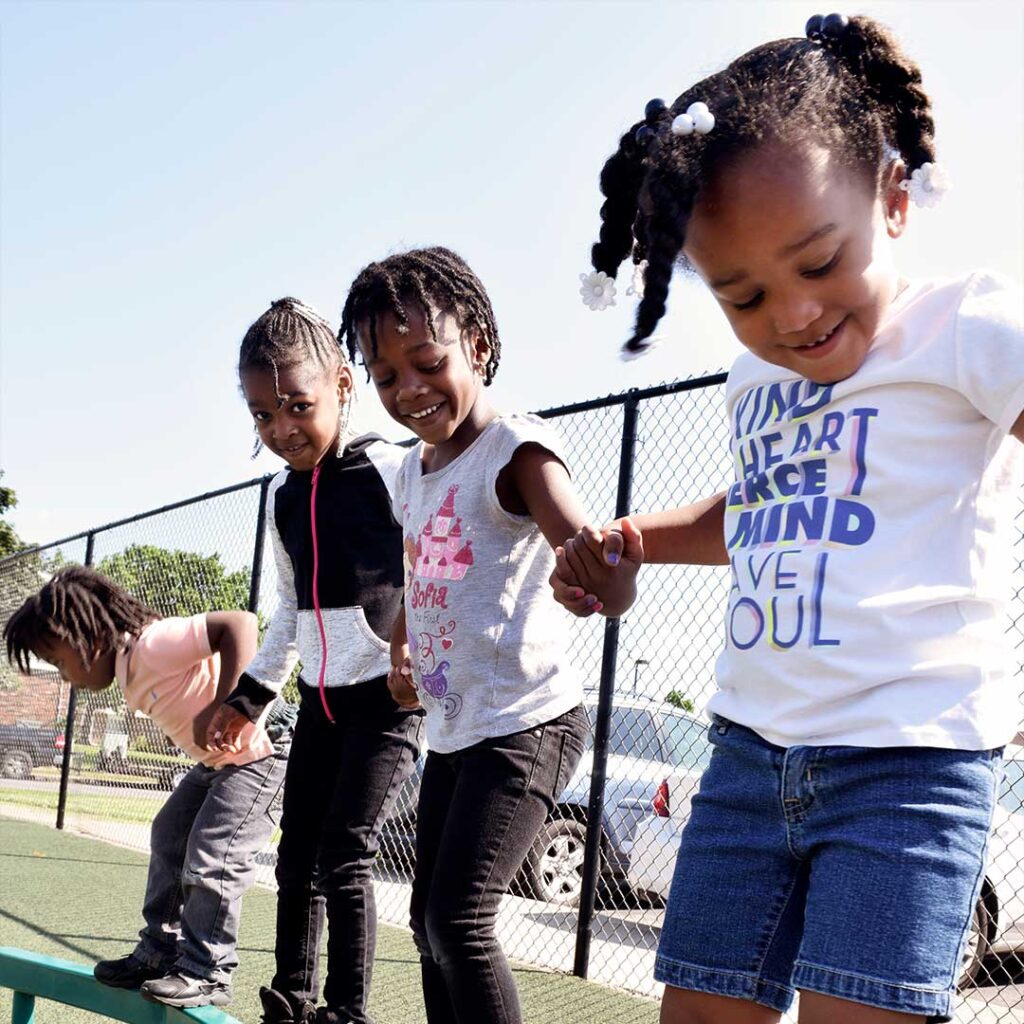
The shift to
upward mobility.
We used to talk primarily about being “anti-poverty.” But that made us think: What are we working toward?”
We’re changing how we talk about our work—using language that is focused on solutions and based on our shared strengths. In order to create an equitable Rochester,
we seek to achieve upward mobility from poverty for everyone in our community – starting with those furthest from the goal.
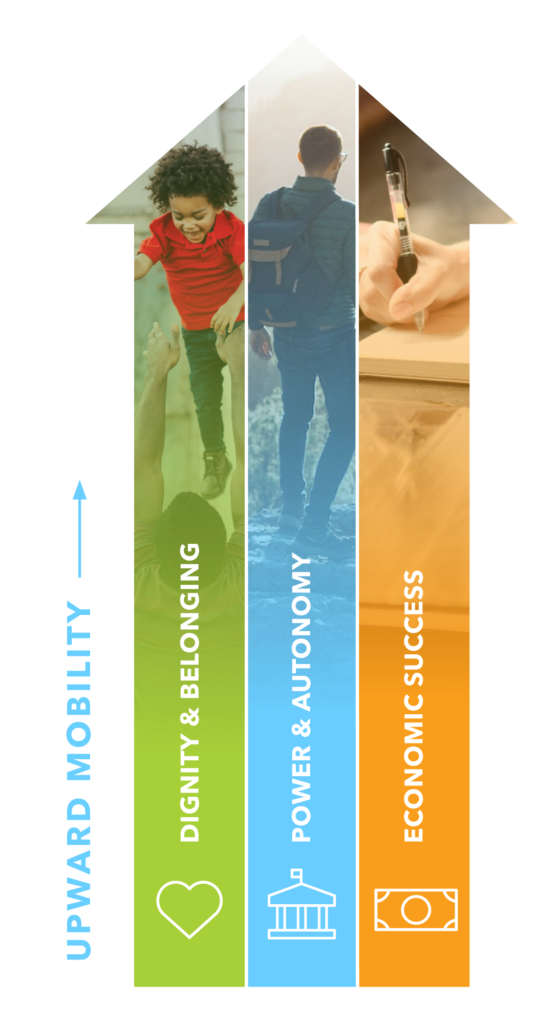
Solving poverty differently requires defining poverty differently and recognizing that poverty is about more than just income. We’ve identified three main drivers of poverty, which means we can find three ways to uproot poverty:
Dignity and Belonging
Feeling the respect, dignity and sense of belonging that comes from contributing to one’s community.
Power and Autonomy
Control over one’s life, the ability to make choices and the collective capacity to influence larger policies and actions that affect one’s future.
Economic Success
Refers to factors that directly contribute to individuals’ and families’ material well-being.
Breaking the cycle of poverty.
The Approach
The goal of the Unity Agenda is to achieve collective impact. In order for the Unity Agenda to be effective, we put a lot of time and intentionality into its creation. Positive outcomes for systems-level poverty reduction are not going to happen overnight.
That’s because solving poverty is
complicated
multifacted
unpredictable
highly specialized
Along this journey, everyone will help shape its course. We hope the Unity Agenda shows how your impact can fit in with others’ impacts, and together we can build momentum toward meaningful change.
Collective action,
collective results.
When developing the Unity Agenda, we needed to take the same approach. We invited a diverse collective of people to the table. Many, including context experts with lived experiences of poverty, and content experts who have studied the impacts of poverty, have shared their wisdom with us.
Our Guiding Principles
These values establish a framework for how we’ll work together and make decisions as we implement the Unity Agenda.
Center Racial Equity
In our community, the racial disparities are stark & pervasive. RMAPI’s work centers racial equity by declaring that racial equity is achieved when race is no longer a determinant of life outcomes. This will mean measuring and evaluating the outcomes of our work with a racialized lens.
Address Collective Trauma
Community trauma, also referred to as collective trauma, means that traumatic events affecting communities may impact a few people but have structural and social traumatic consequences. This type of systems trauma, just like individual trauma, affects cognitive decision-making and can lead to reduced civic engagement, weakened social networks, and lower social cohesion. To foster inclusion and belonging, we must acknowledge this community trauma and take intentional steps to heal and repair historical and ongoing hurt.
Revitalize Neighborhoods
RMAPI seeks to transform communities at scale through systems-change work. We will continue to advocate for equity in allocating resources and opportunities to neighborhoods that have been disinvested and underserved for decades.
How can we uproot poverty?
Poverty is a systemic problem that requires systemic solutions, or “systems change.” Systems change solutions are transformative approaches that span institutions, focus on everything from policies to organizational culture, alter how our society operates, and shift both cultural values and political will. That’s why this work is ambitious. But remember:
Systems, at their core, are run by people. Systems will not change without a change in human behavior.
Take a look at some conditions of systems change. Where do you hold power? Where do you see yourself influencing?
What are the conditions of systems change?
(Explicit)
Structural Change:
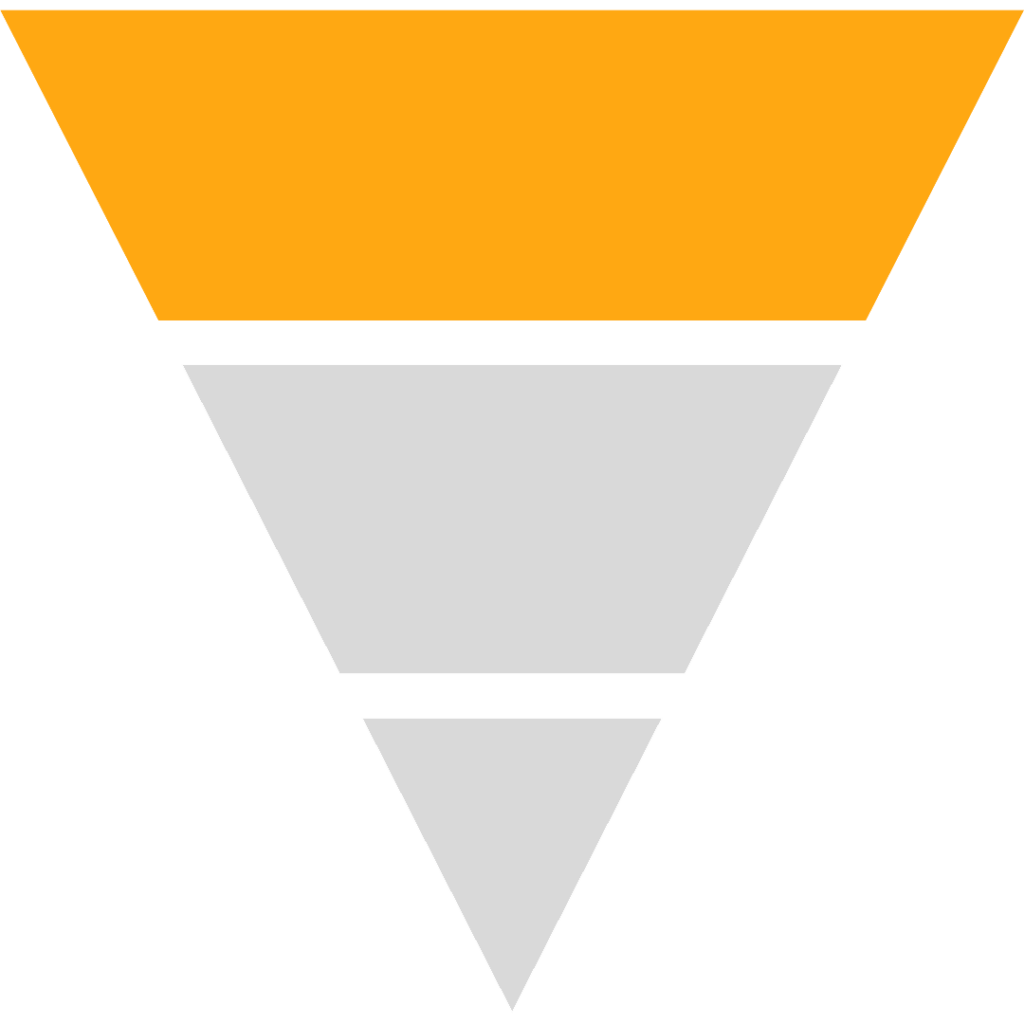
(Semi-Explicit)
Relational Change:
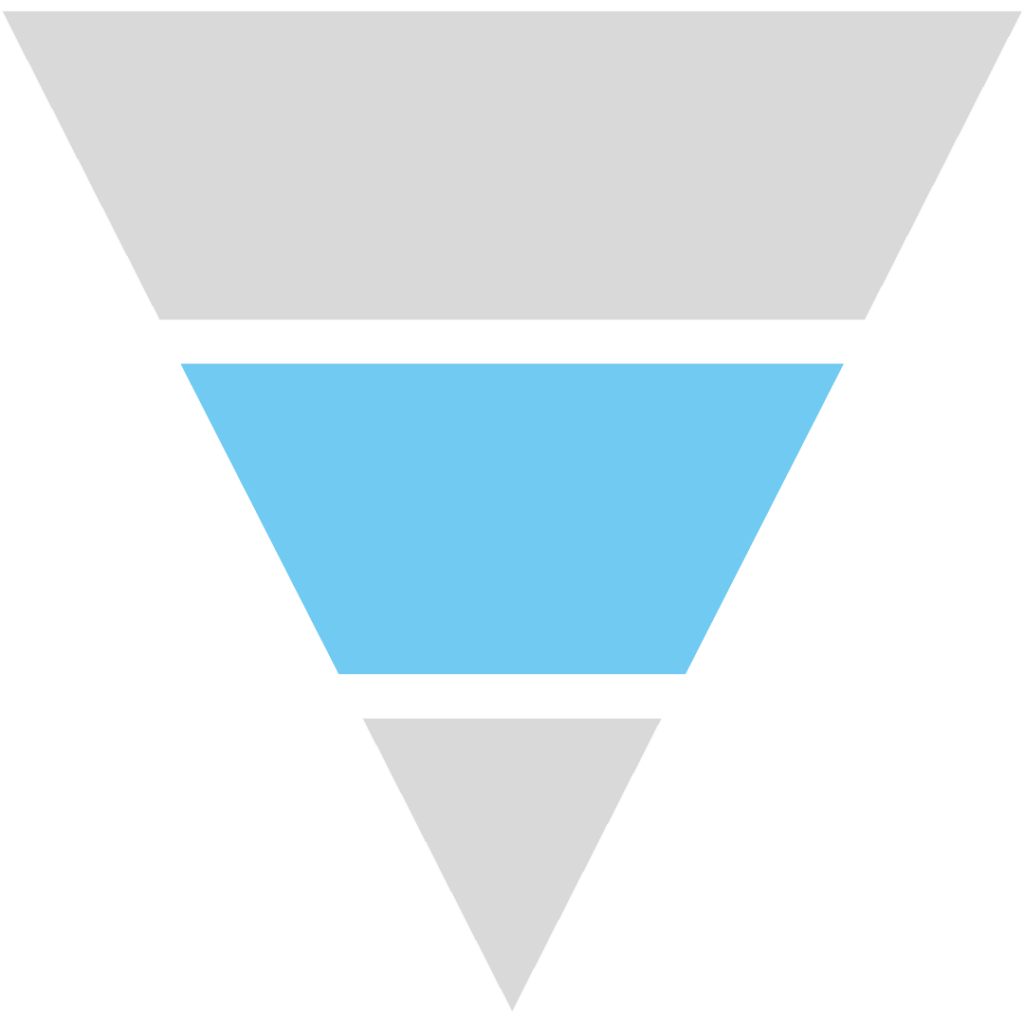
(Implicit)
Transformative Change:

This model is adapted from John Kania, Mark Kramer, and Peter Senge’s The Waters of Systems Change.
Our Systems Change Goals
The RMAPI Collective has developed a set of systems outcomes and goals that define the work of our Unity Agenda. We looked at the barriers to upward mobility in our communities, collected input from content and context experts, and invited learnings from across the country. These statements reflect the visionary systems changes that we want to see, and what it will look like when our goals are achieved.
We envision a future where everyone…
Our decisions and actions will center those who have been historically disadvantaged by racism, trauma and community disinvestment.
How Will RMAPI Succeed?
Our Unity Agenda is ambitious, and the RMAPI Collective is energized by our goals. We will draw on the diverse tools, skills, strengths, and resources of each collective member, including our strategic partners, to make these changes happen at every level of systems change.
For each strategic outcome, we will:
Act
Take direct action to address this goal in the Rochester community. The RMAPI Collective takes the lead on reaching these goals and is accountable and responsible for developing and executing a plan of action. If we aren’t the best organization to act to achieve a goal, we will instead align with or assess that goal.
Partner with existing organizations that are already working to realize a systems outcome or goal in our community. This could look like providing technical support or consultation, co-leading initiatives with municipal governments, signing onto letters of support, and participating on commissions or task forces that are addressing this outcome.
ASSESS
Use our resources and tools to monitor and evaluate community initiatives to ensure meaningful progress is being made. This includes supporting evaluation via results-based accountability reporting, and responding to key New York State reports on poverty and other measurements such as the American Community Survey.
Our community is powerful. The Unity Agenda is a roadmap for achieving poverty alleviation together. If we aren’t the best organization to act on a systems outcome, we will instead align or assess that outcome. As you look at the three A’s of engagement above, think about how you might act, align, or assess on each systems goal on the previous page. This is how, together, we can turn a theory of change into a reality of change for our region.
How Will You Engage?
This Isn’t Business as Usual.
Poverty is a complex, long-standing issue that requires complex, long-lasting solutions. In the past, too many players addressing social issues were working alone, without coordination within or among their efforts or sectors.
The Unity Agenda is different. It serves as a vital anchor in our community, and it harnesses the power of Rochester’s organizations, businesses, neighborhoods, government entities, and community members to achieve upward mobility for all.
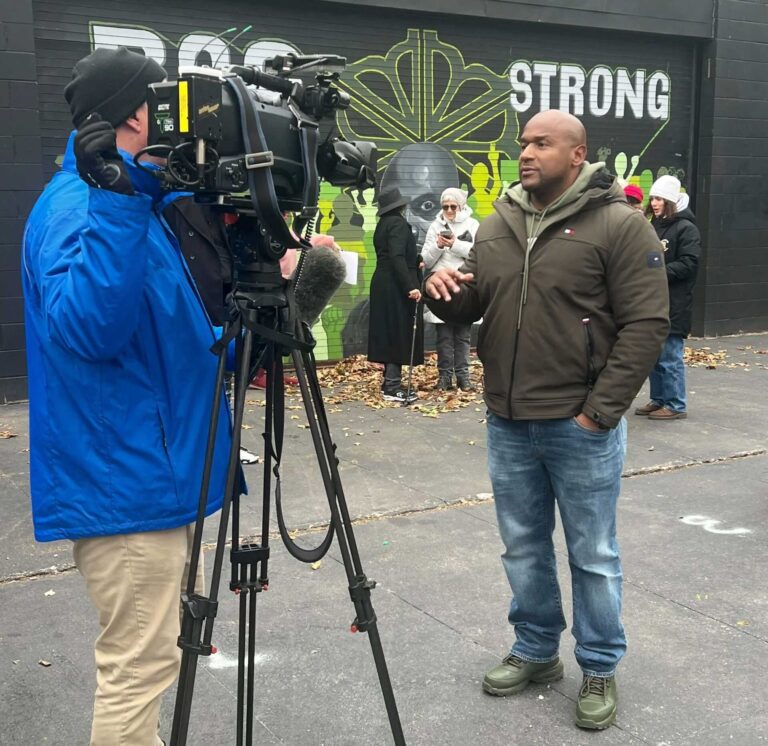
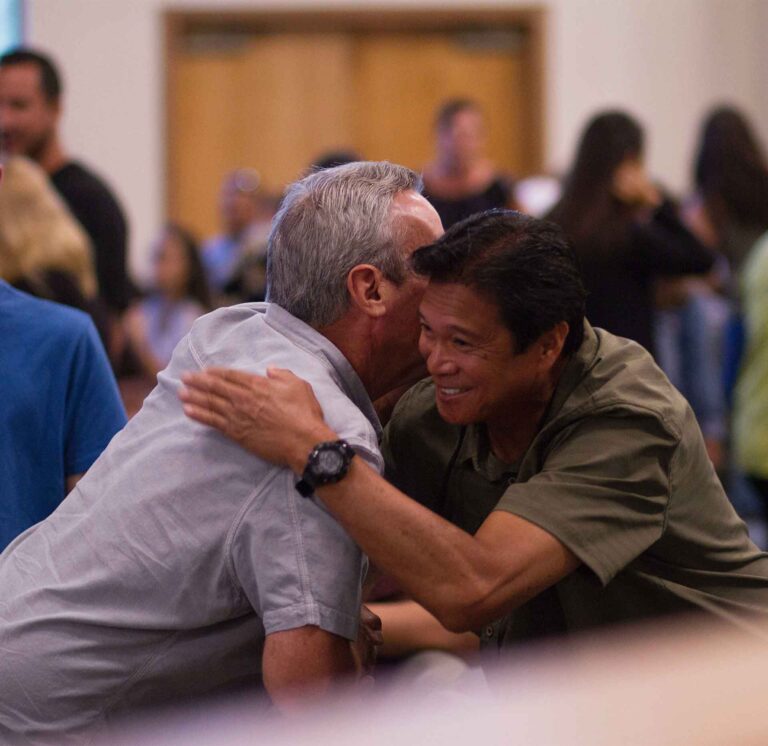
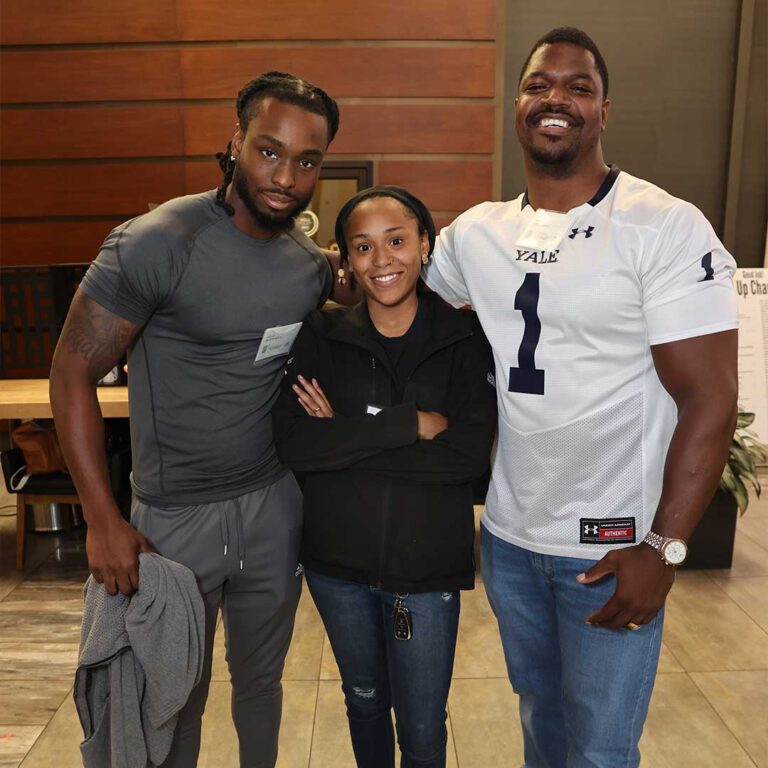
How It’s Different.
It starts with a unity agenda.
That means coming together to collectively define the problem and create a shared vision to solve it.
It establishes shared measurement.
That means tracking progress in the same way, allowing for continuous learning and accountability.
It fosters mutually reinforcing activities.
That means integrating the participants’ many different activities to maximize the end results.
It encourages continuous communication.
That means building trust and strengthening relationships.
And it has a strong backbone.
That means having a team dedicated to aligning and coordinating the work of the group.
I support this Unity Agenda and believe all people in our community should have access to what they need to thrive.
The RMAPI Collective
RMAPI is a community-wide coalition working together to break the cycle of poverty by shifting power to enable upward mobility for all families.
RMAPI Community Advisory Council
Cynthia Cole
Evelyn Irons
Laura Hammond
Linda Baier
Trelawney McKnight-Jenkins
Pastor Wanda Wilson
Our Staff
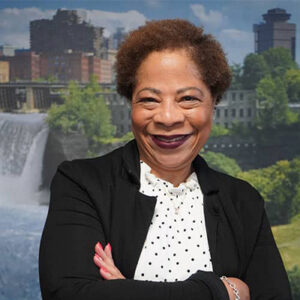
AQUA PORTER
Executive Director
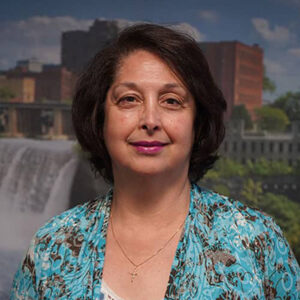
PATRICIA COLLADO
Administrative
Assistant
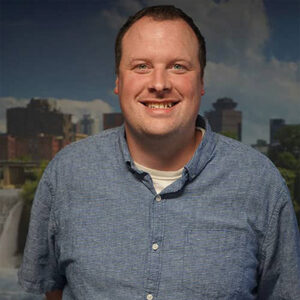
NATE DOUGHERTY
Communication
Coordinator

MADISON BYRNE
Operations Manager
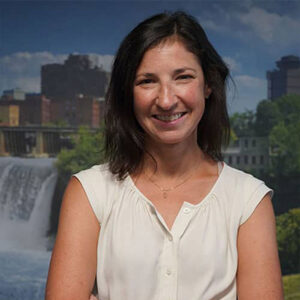
REBEKAH MEYER
Operations Manager
Steering Committee:*
Corinda Crossdale, RMAPI Chair, Chief Customer and Community Experience Officer, RTS
Simeon Banister, RMAPI Vice Chair, President and CEO, Rochester Area Community Foundation
1199 SEIU United Healthcare Workers East
7th Judicial District, New York State
Action for a Better Community, Inc
Assemblymember Harry Bronson, NYS Assembly District 138
Center for Governmental Research
Common Ground Health
Connected Communities
County Executive Adam Bello, Monroe County
East High Educational Partnership Organization
Empire State Development
ESL Federal Credit Union
Finger Lakes Performing Provider System
Goodwill of the Finger Lakes
Greater Rochester Chamber of Commerce
Greater Rochester Health Foundation
Ibero American Action League
Max and Marian Farash Charitable Foundation
Mayor Malik Evans, City of Rochester
Monroe Community College
NYS Assembly District 138
Rep. Joseph Morelle, NY 25th Congressional District
ROC The Future Alliance
Rochester Area College Presidents
Rochester Area Community Foundation
Rochester Educational Opportunity Center
Rochester Housing Authority
Rochester Regional Health System
Rochester Works!
RTS
The Children’s Agenda
TogetherNow
United Way of Greater Rochester and the Finger Lakes
University of Rochester
Urban League of Rochester
US Ceiling Corp
YWCA Rochester and Monroe County
*Partners as of March 2023.
Corinda Reaves, RMAPI Chair, Chief Customer and Community Experience Officer, RTS
Simeon Banister, RMAPI Vice Chair, President and CEO, Rochester Area Community Foundation
1199 SEIU United Healthcare Workers East
7th Judicial District, New York State
Action for a Better Community, Inc
Assemblymember Harry Bronson, NYS Assembly District 138
Center for Governmental Research
Common Ground Health
Connected Communities
County Executive Adam Bello, Monroe County
East High Educational Partnership Organization
Empire State Development
ESL Federal Credit Union
Finger Lakes Performing Provider System
Goodwill of the Finger Lakes
Greater Rochester Chamber of Commerce
Greater Rochester Health Foundation
Ibero American Action League
Max and Marian Farash Charitable Foundation
Mayor Malik Evans, City of Rochester
Monroe Community College
NYS Assembly District 138
Rep. Joseph Morelle, NY 25th Congressional District
ROC The Future Alliance
Rochester Area College Presidents
Rochester Regional Health System
Rochester Area Community Foundation
Rochester Educational Opportunity Center
Rochester Housing Authority
Rochester Works!
RTS
The Children’s Agenda
TogetherNow
United Way of Greater Rochester and the Finger Lakes
University of Rochester
Urban League of Rochester
US Ceiling Corp
YWCA Rochester and Monroe County
*Partners as of March 2023.
